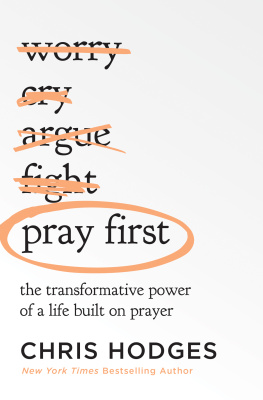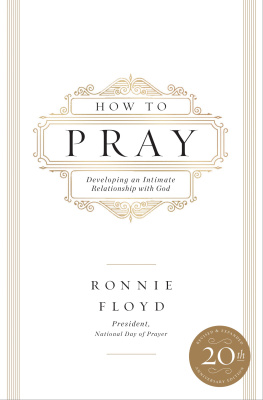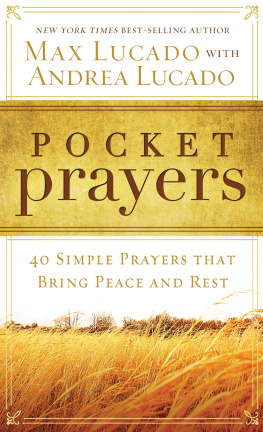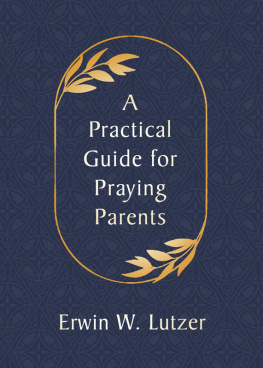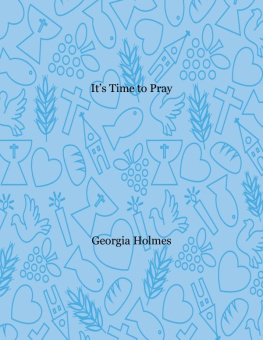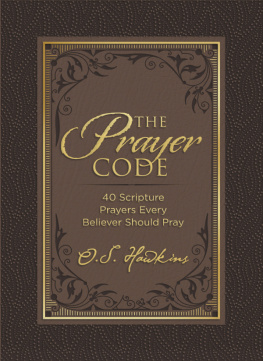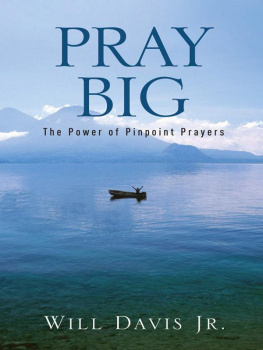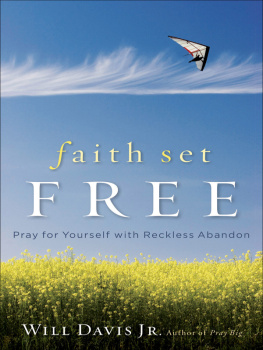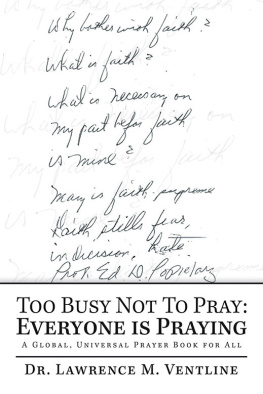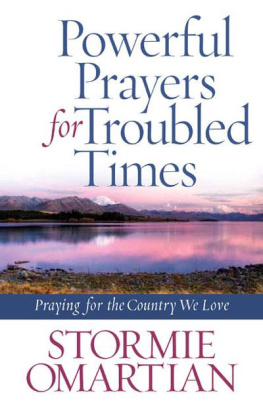JUST IN TIME!

P ASTORAL
P RAYERS IN
P UBLIC P LACES
F. Belton Joyner Jr.
Abingdon Press
Nashville
JUST IN TIME!
PASTORAL PRAYERS IN PUBLIC PLACES
Copyright 2006 by Abingdon Press
All rights reserved.
The prayers in this book may be reproduced by local church congregations, provided the following credit line and copyright notice appear on all copies: From Pastoral Prayers in Public Places. Copyright 2006 by Abingdon Press. Used by permission. No other part of this work may be reproduced or transmitted in any form or by any means, electronic or mechanical, including photocopying and recording, or by any information storage or retrieval system, except as may be expressly permitted by the 1976 Copyright Act or in writing from the publisher. Requests for permission should be addressed to Abingdon Press, P.O. Box 801, 201 Eighth Avenue South, Nashville, TN 37202-0801 or permissions@abingdonpress.com.
This book is printed on acid-free paper.
Library of Congress Cataloging-in-Publication Data
Joyner, F. Belton.
Pastoral prayers in public places / F. Belton Joyner Jr.
p. cm. -- (Just in time!)
ISBN 0-687-49567-9 (binding: adhesive : alk. paper)
1. Prayers. 2. Pastoral prayers. 3. Pastoral theology. I. Title. II. Just in time! (Nashville, Tenn.)
BV245.J69 2006
264'.13dc22
2005022943
All scripture quotations unless noted otherwise are taken from the New Revised Standard Version of the Bible, copyright 1989 by the Division of Christian Education of the National Council of the Churches of Christ in the United States of America. Used by permission. All rights reserved.
06 07 08 09 10 11 12 13 14 1510 9 8 7 6 5 4 3 2 1
MANUFACTURED IN THE UNITED STATES OF AMERICA
To Toni
who prays with me every day
C ONTENTS
I NTRODUCTION
Ray said that he was asked to pray at the dedication of his small towns new sewer plant. Frank reported that a local church wanted him to pray at the first use of its sidewalk. Diane mentioned a church member who wanted prayer at the burial of the familys pet iguana. (Someone else, she was told, would be providing the music.)
Pastors, expected to pray or preach at a moments notice, are often put into situations in which prayer is difficult. The difficulty might be the occasion (death from a suicide), or the setting (the scene of an accident), or the tensions (an accusation of sexual abuse), or the routine (yet another family reunion). In truth, there are times when a pastor might feel inclined to follow the injunction of Jesus to do your praying in secret (Matthew 6:6)!
This book considers some ways of praying in these hard places. Pastors (and others with a ministry of prayer) may find the pages of this volume a beginning point for their own times of praying. Some of the prayers may offer language or images that can be borrowed. In some cases, a pastor might choose to pray in the words of this book. In each of these cases, the prayers shared here are projected as ways to get started when called on to pray in a thorny situation.
One friend asked me why there should be a book of prayers when the Holy Spirit should give the pastor the words for a prayer (Romans 8:26). A book of prayers will never contain all that goes on in a conversation with God, but I shall miss many of Gods blessings if I put a box around where the Spirit might show up! This compilation of prayers grows out of a conviction that the Holy Spirit has been present in northern Durham County, North Carolina, as these prayers were written.
Another colleague raised an important question: Are there times when it is not appropriate to pray? It is possible for dialogue with God to be cheapened by casualness or to be blocked by inattention, but the Christian tradition honors incarnationthe Word became flesh and lived among us (John 1:14)and that presence of God has given some very unlikely places the possibilities of holiness! A pastor might well need to exercise discernment and even say no to an invitation for public prayer, but only if such praying is proposed as mere window-dressing. Even then, a prayer might serve as a corrective focus.
What about prayers in settings where persons of many faiths will be present? Even when everyone at hand is Christian, there is great variety and range of journey! How is that to be honored? When non-Christians are part of the assembly, Christian pastors do well to recall the respect to which Jesus invited us when he said, I have other sheep that do not belong to this fold (John 10:16a). Some Christians feel that integrity demands that they always pray in Jesus name. If praying in Jesus name means to pray in the spirit and attitude and power of Jesus, then such a prayer will not seek to create undue boundaries but will move to respect where each one is on his or her path. (Our Lord was often accused of mingling with sinners.) When I thought that prayers in this book would be used in multiple-faith venues, I tried to avoid language that would keep non-Christians from having access to the throne of grace. After all, the prayer our Lord taught us (Matthew 6:9-13) contains a great deal about Jesus but does not use any words about Jesus.
These prayers blend entreaty, praise, mystery, confession, thanksgiving, and wonder. (Some hard places call for more of one than another.) Prayers are addressed to God. That observation may seem a bit basic, but we are often tempted to use address to the Almighty as an opportunity to announce to the congregation, O Lord, please bless the youth meeting this afternoon which will meet at 5:00 instead of 6:00 as previously planned. A companion temptation is to advise the Lord of matters of which God surely is aware, O God, as You know, on page 3 of section B of todays paper we have read of a fire at a store downtown. Having noted these potential hazards, let me ponder a bit about why a pastor might indeed tell God some things God already knows!
Public prayer is more than an exhibition of the pastors personal prayer life. Public prayer is in behalf of that public! Although there may be one voice expressing the prayer, it is a prayer of all the people. How can someone know and feel that a prayer is his or her prayer even if someone else is speaking it? If I recognize myself when the pastor brings feelings, emotions, angers, guilts, pleas, thanksgivings before God, then I can claim that prayer as ours, even mine.
For example, in a prayer suggestion for use when there has been the denial of abuse, there is this line: Our anger comes from our fear, fear of retribution, fear of continued abuse, or fear of continued false accusation. That sentence, on its own, could well pass for a word from a sermon (or counseling session) addressed not to God but to the congregation. However, in the context of public prayer, that sentence becomes a way of helping others recognize themselves in the prayer language of the pastor, so the prayer also becomes their prayer. When I can say (as I hear a prayer), Yeah, thats me, I can also join in the petition to God as my petition, the praise of God as my praise, the confession to God as my confession.
Another example: in a prayer with a child who is in the midst of a custody decision, a suggested prayer seems to describe the obvious to God: (Evan) loves his mother, and he loves his father, and he is sad that they do not love each other. As the child, Evan, eavesdrops on these words said to God, he is more likely to see this as his prayer.
There are many forms for prayers in the hard places. The prayers in this collection sometimes call for silence, sometimes ask participants to repeat phrases, sometimes close with the Lords Prayer. Persons who are going through trauma together might find strength in holding hands as they pray. There is a special power in kneeling when praying. There is a claim upon a prayer when all are asked to close with an Amen. (This can be cued simply by saying, And all Gods people said... Amen.)
Next page

